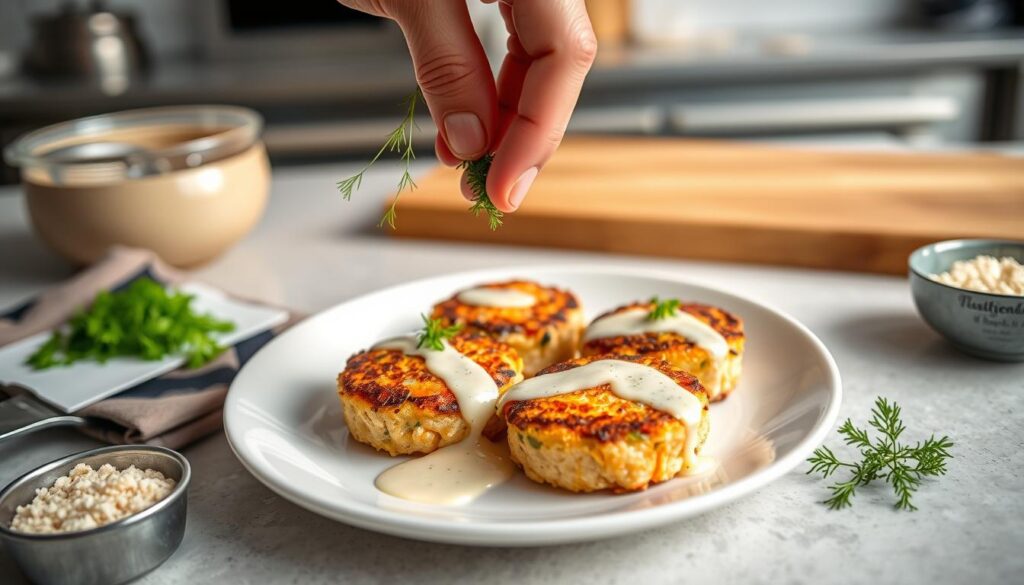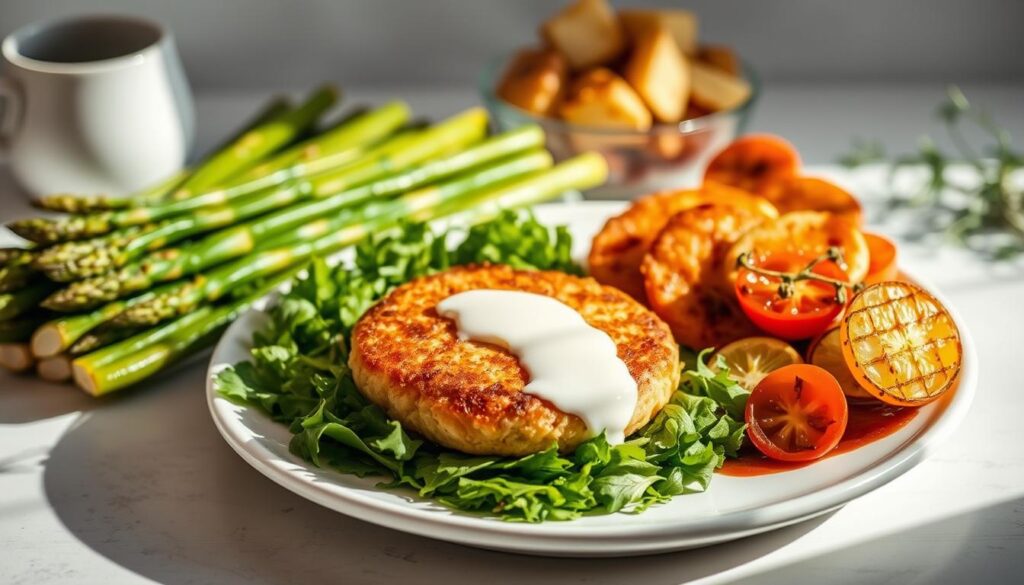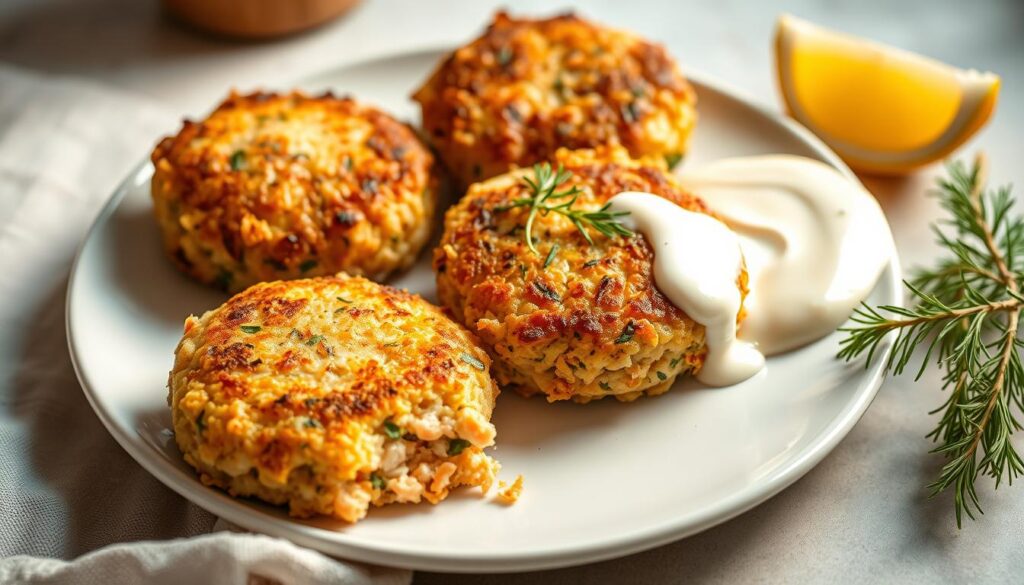Imagine turning a chaotic weeknight into a peaceful moment. Golden-brown patties with a crispy outside and flaky salmon inside are the answer. These salmon cakes are easy to make and impress everyone, from kids to seafood fans.
These salmon cakes are quick to prepare in under 30 minutes. They’re also a canvas for your creativity. You can change veggies, spices, or sauces. Plus, they freeze well for quick breakfasts or lunches.
Key Takeaways
- Perfect for busy schedules: Ready in 30 minutes with simple ingredients.
- Suitable for all eaters: Adaptable to fresh or canned salmon and dietary preferences.
- Nutritionally balanced: High in protein and healthy fats, low in carbs.
- Freezer-friendly: Store leftovers for up to 3 months.
- Customizable flavors: Adjust herbs, spices, and sauces to taste.
What Makes Salmon Cakes a Perfect Weeknight Dinner
Looking for a meal that’s nutritious, affordable, and ready in under 30 minutes? Easy salmon cakes fit the bill. They’re a weeknight winner for many reasons:
The Nutritional Powerhouse of Salmon
Salmon cakes are packed with 28g protein and heart-healthy omega-3s. They also have lots of vitamin B12 and D. These nutrients boost energy and immunity. Plus, each patty has 331mg potassium, great for busy days.
Budget-Friendly Seafood Option
- Canned salmon is half the price of fresh but works great in quick salmon cakes.
- Use 2 cups of Panko breadcrumbs and pantry staples like ¼ cup red onion to stretch portions.
- Make 12 patties for under $3 each—cheaper than takeout!
Time-Saving Meal Solution
Ready in 25 minutes, easy salmon cakes need just 15 minutes to prep. Use leftover salmon or canned salmon to save time. Mix ingredients while the skillet heats up. Flip patties 3-4 minutes per side for a golden finish.
The History and Cultural Significance of Salmon Cakes
Homemade salmon cakes are more than just a meal. They connect us to the past. They tell stories of survival and culture.
In ancient Ireland, salmon was seen as a symbol of abundance. It was tied to legends like the “Salmon of Knowledge.” Eating the fish was believed to give wisdom.
For thousands of years, the Pacific Northwest’s indigenous peoples relied on sockeye salmon. They dried and smoked it, using it as a trade item.
“The salmon’s return was celebrated in ceremonies ensuring future abundance.”
During the Great Depression, salmon cakes were a practical solution. They turned leftovers into nourishing meals. Today, they are a comfort food, showing resilience.
Coastal communities around the world have their own versions. From Alaska’s smoked salmon to Korean eomuk made from pollock. These dishes show regional identities and honor ancestral practices.
| Type | Calories (per 100g) | Protein (g) | Fat (g) |
|---|---|---|---|
| Asian-style | 113.6 | 13.2 | 0.67 |
| Western | 201 | 13.65 | 10.49 |
Today, chefs follow sustainable practices, just like our ancestors. Indigenous-led efforts protect salmon habitats. This ensures homemade salmon cakes stay connected to our heritage.
Whether enjoyed as comfort food or in cultural ceremonies, these cakes tell a story. They show that food is more than just nourishment. It’s a story of survival and continuity.
Essential Ingredients for the Best Salmon Cakes Recipe
Creating the best salmon cakes recipe begins with the right ingredients. Whether for a quick dinner or a special occasion, each part affects the taste and texture.
Choosing the Right Salmon: Fresh vs. Canned
Wild-caught salmon, like king or sockeye, brings a rich flavor. Canned salmon, such as Wild Planet, is quicker. Use 2 cans (6 oz each) or 1¼ lb fresh fillets. Make sure to drain canned salmon well to avoid soggy cakes.
Must-Have Binding Ingredients
For cakes that stick together well, use:
- 2 large eggs lightly beaten
- 2 Tbsp mayonnaise for moisture
- 1¼ cups panko or almond flour for crunch
Don’t overmix to keep the patties light.
Herbs and Seasonings That Elevate Flavor
For a balanced taste, add:
- ½ cup chopped parsley for freshness
- Old Bay seasoning or garlic powder for depth
- Lemon juice (1 Tbsp) to balance richness
Season with ½ tsp black pepper and ¾ tsp salt.
Optional Add-ins for Texture and Taste
Enhance your homemade salmon cakes with:
- ¼ cup finely diced onion or bell pepper
- 2 Tbsp capers for a salty kick
- 3 scallions for color and crunch
Mix gently to keep the vegetables’ texture.
Equipment You’ll Need to Prepare Homemade Salmon Cakes
Making homemade salmon cakes is easy with just a few kitchen tools. You probably already have most of what you need. Let’s look at what’s must-haves and what’s nice to have.
- Large bowl (mixing ingredients)
- Fork (to flake salmon)
- Skillet (non-stick or cast iron) or baking sheet
- Measuring cups/spoons (for precise ratios)
- Spatula (for flipping patties)
Optional but helpful:
- Food processor (chopping herbs or veggies)
- Ice cream scoop (uniform portion sizes)
- Parchment paper (non-stick surface)
| Method | Equipment | Notes |
|---|---|---|
| Stovetop | Skillet + spatula | Cook 2-3 mins per side on medium heat |
| Oven | Baking sheet + parchment | Preheat to 425°F; bake 15-20 mins |
Even with just the basics, the simple salmon cakes recipe works great. Use your hands to shape patties if you don’t have an ice cream scoop. Cast iron or stainless steel skillets are best for browning. Store leftovers in airtight containers for up to 3 days.
Step-by-Step Salmon Cakes Recipe
Learn to make salmon cakes with these easy steps. First, bake salmon fillets at 425°F for 10-13 minutes until they’re flaky. Then, let them cool before flaking into a bowl. If using canned salmon, make sure to drain it well to prevent soggy cakes.
- Mix the flaked salmon with ¼ cup mayonnaise, 1 tbsp lemon juice, 1 tsp Dijon mustard, 1 tsp Old Bay, ¾ tsp salt, and ¼ tsp black pepper. Add ¼ cup chopped scallions and ⅓ cup diced celery to the mix.
- Combine 1 cup panko with ¼ cup in the mixture. Shape the batter into 7-8 patties, each about ½-inch thick. Chill them for 30 minutes to firm up.
- Heat 1 tbsp oil in a skillet. Coat the patties with the remaining panko. Fry them on medium heat for 3-4 minutes on each side. Or, bake at 400°F for 12 minutes per side on a parchment-lined sheet.
“For crispy salmon cakes, avoid overcrowding the pan. Cook in batches if needed to prevent steaming instead of frying.”
Enjoy your salmon cakes with tartar sauce and a side salad. Each serving has about 280 calories, 14g protein, and 22g fat. Remember, don’t overmix the batter to keep the cakes tender.
Common Mistakes to Avoid When Making Easy Salmon Cakes
Making easy salmon cakes needs care. Steer clear of these mistakes to get perfect results every time.

Preventing Crumbly Cakes
The type of salmon and how you mix it are key. Too much mixing can ruin the texture. The wrong mix can make them fall apart. Here’s what to do:
| Salmon Type | Binding Adjustments |
|---|---|
| King Salmon | Reduce eggs by 1/2 if oil-rich |
| Canned Salmon | Add 2 tbsp mayo per 1 lb flaked fish |
Chill the mix for 30 minutes before shaping. This helps it hold its shape better.
Avoiding Undercooked or Overcooked Results
- Cook at 375°F for baked versions: 15-20 mins until internal temp reaches 145°F
- Pan-fry 3-4 mins/side on medium heat. Avoid overcrowding the skillet
- Overcooking dries pattieses. Use a meat thermometer to confirm doneness
Seasoning Errors to Watch For
Too much salt or uneven flavors are common. Here’s how to avoid them:
- Sample the mixture before forming cakes
- Adjust herbs after tasting uncooked batter
- Reduce salt if using canned salmon (already salted)
Good seasoning and quality ingredients are key for the best salmon cakes.
Healthy Swaps and Modifications for Dietary Needs
Making the healthy salmon cakes recipe fit your diet is simple. Start with the simple salmon cakes recipe and then make changes. Here are some tested swaps:
- Gluten-Free Option: Use almond flour or crushed gluten-free crackers instead of breadcrumbs. They keep the texture great.
- Dairy-Free: Swap mayo for Greek yogurt or avocado. For creamy results, try So Delicious dairy-free yogurt.
- Low-Carb:
- Egg-Free:
- Sodium Reduction:
Mix psyllium husk powder with water as a binder. It adds bulk without carbs, keeping each patty under 5g net carbs.
Replace one egg with 1 tablespoon chia seeds mixed with 3 tablespoons water. Let it rest for 10 minutes.
Omit added salt and use low-sodium broth. Kelp powder adds flavor with 1/3 the sodium of regular salt.
Add spinach or finely chopped cauliflower to increase fiber and nutrients. This won’t change the healthy salmon cakes structure. For keto diets, use coconut aminos instead of soy sauce. These changes make your simple salmon cakes recipe fit any lifestyle—vegan, paleo, or just watching calories.
Delicious Sauce Pairings for Your Crispy Salmon Cakes
Make your crispy salmon cakes even better with the right sauces. The best salmon cakes recipe comes alive with the perfect condiments. Choose from tangy, creamy, or spicy sauces to elevate your meal.
Classic Tartar Sauce with a Twist
Give tartar sauce a boost with capers or fresh herbs. Mix mayonnaise, lemon juice, dill, and a bit of hot sauce for a zesty twist. Serve it cold with your golden cakes for a refreshing touch.
Creamy Dill Sauce
A creamy dill sauce is made with mayonnaise, fresh dill, lemon zest, and lemon juice. It’s light yet full of flavor, perfect for the flaky salmon. It adds a bright, herbaceous taste to each bite.
Spicy Remoulade
For those who like it hot, try a spicy remoulade. It’s a mix of mayonnaise, ketchup, Worcestershire sauce, and hot sauce. Adjust the heat by adding more tabasco or cayenne.
Light Yogurt-Based Options
A yogurt-based sauce with garlic, chives, and lemon is tangy but light. Greek yogurt makes it creamy. It’s a diet-friendly choice that pairs well with your crispy salmon cakes.
Try out these sauces to find your favorite. They’ll make your homemade best salmon cakes recipe even better. Enjoy the perfect mix of textures and flavors.
Side Dishes That Complement Simple Salmon Cakes Recipe
Pair your simple salmon cakes recipe with sides that enhance their fresh flavors. These options keep meals balanced and quick, matching the ease of your quick salmon cakes. Choose from 18 curated options, 61% of which are veggie-focused, ensuring variety without added complexity.

Quick options like sautéed green beans (10-minute prep) or roasted broccoli save time. Gluten-free choices cover 83% of selections, from quinoa to cauliflower rice. Here’s how to pick:
| Category | Top Picks | Prep Time |
|---|---|---|
| Vegetable Sides | Roasted Brussels sprouts, sautéed mushrooms, lemon-cucumber salad | 10–15 mins |
| Starches | Quinoa, baked sweet potatoes, cauliflower rice | 15–20 mins |
| Quick & Light | Spinach salad, cherry tomatoes with balsamic glaze | 5 mins |
Try the 4.6★ quinoa veggie salad for protein or 4.9★ broccoli salad’s tangy crunch. For hearty meals, pair with egg-fried rice (4.7★) or garlic green beans (4.8★). Serve ½–1 cup per person and mix textures—crispy cakes with creamy mashed potatoes or earthy roasted veggies. Most dishes align with the recipe’s time-saving theme, ensuring meals stay under 30 minutes.
Make-Ahead and Storage Tips for Quick Salmon Cakes
Make your life easier with smart storage and prep tips. Here’s how to keep your quick salmon cakes fresh and ready for any meal:
Freezing Instructions
- Let cooked or uncooked patties cool completely before storing.
- Layer patties on a baking sheet, freeze until solid, then transfer to a freezer-safe bag. Use parchment paper between layers to prevent sticking.
- Label and freeze for up to 1 month. For uncooked patties, bake directly from frozen—add 2-3 extra minutes to cooking time.
Reheating Methods
Revive patties with these techniques:
- Microwave: Place on a damp paper towel, cover with a second towel, and heat at 50% power for 1-2 minutes per patty.
- Oven: Bake at 350°F for 10-15 minutes until warmed through.
- Air Fryer: Reheat at 350°F for 2-4 minutes per side.
Meal Prep Strategies
Batch-cook patties for busy weeks:
- Prep ingredients in advance: Mix binders like breadcrumbs and egg, then refrigerate for up to 24 hours.
- Assemble patties weekly and freeze uncooked. Portion into family-sized batches for quick thawing.
- Pair with pre-cooked veggies or grains to create grab-and-go lunches. Store in airtight containers for 2-3 days.
Salmon Cake Variations From Around the World
Try new flavors in your salmon cakes recipe from Asia to Scandinavia. Each culture adds its own twist, making healthy salmon cakes with unique tastes. Just swap ingredients to follow local traditions.
| Region | Key Ingredients | Tip |
|---|---|---|
| Asian | Ginger, scallions, soy sauce, wasabi | Shape into small patties and serve with pickled veggies |
| Mediterranean | Sun-dried tomatoes, Kalamata olives, oregano | Bake instead of fry for lighter results |
| Scandinavian | Fresh dill, aquavit, mustard-dill sauce | Garnish with cucumber slices |
| Latin | Cilantro, jalapeños, lime zest | Pair with avocado crema |
Healthy salmon cakes are all about fresh herbs and less is more. Try using crushed cornflakes instead of breadcrumbs for a Caribbean twist. Add spinach for an Italian flair. For Mediterranean versions, air-fry at 400°F for 6 minutes per side.
When adapting your recipe, mix 1 part regional herb with 3 parts salmon. For example, add 1 tbsp. of harissa paste for a North African flavor. Make sure each change keeps the calorie count around 195 kcal per patty. Share your creations and inspire others to enjoy global flavors!
Conclusion: Why These Salmon Cakes Will Become Your Family’s New Favorite
Looking for the best salmon cakes recipe? These crispy ones are ready in just 25 minutes. Their golden crust and flaky inside are perfect for any night or event. Plus, they’re full of protein and omega-3s, making them great for any diet.
Since 2007, this recipe has been a hit, with updates in 2024 and 69 reviews. Serve them with dill sauce or remoulade and a fresh arugula salad for a full meal. With only 232 calories per serving, they’re both delicious and healthy. They’re quick, nutritious, and sure to become a favorite in your home.



